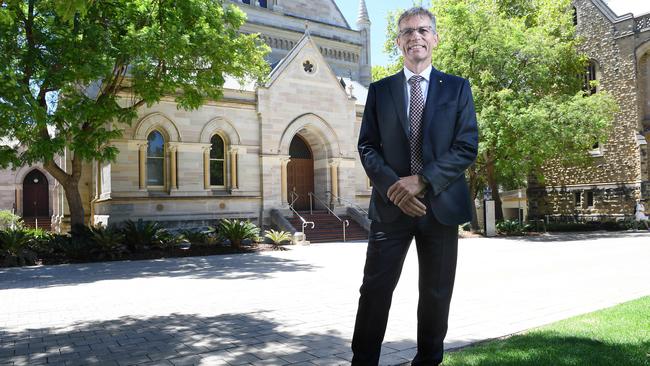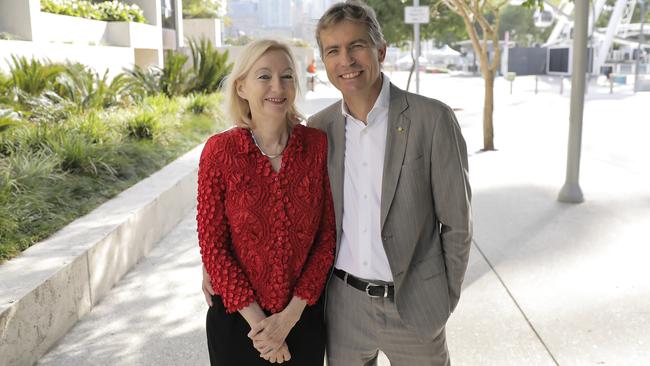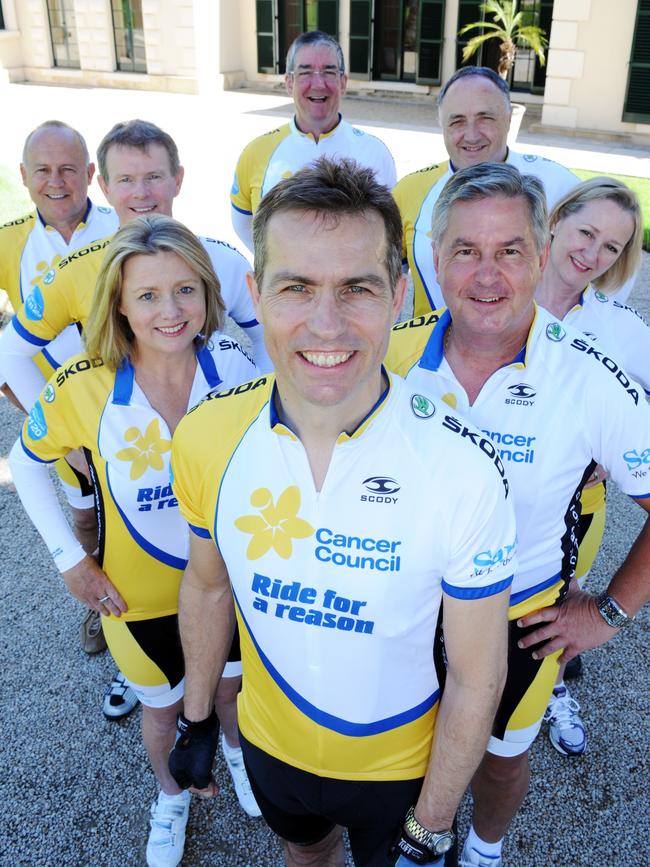Peter Hoj returns to SA – again – to help lead Adelaide University out of a troubled time
Adelaide Uni’s new vice-chancellor Peter Hoj starts on Monday after years working interstate. He reveals what brought him back – and what’s next.

SA News
Don't miss out on the headlines from SA News. Followed categories will be added to My News.
It’s a second homecoming to Adelaide for Peter Hoj as he becomes vice-chancellor of Adelaide University.
His return after eight years in Queensland followed an earlier gap in Canberra which took him away from the city he fell in love with when he first moved here in 1994.
“After I left, my children and their friends lived in our house for eight years and it’s being renovated now because that’s what happens,” he said.
“Keeping the house was the clearest indication I always wanted to come back.
“Our two children are here, they’re Adelaide University graduates and we have two grandchildren now so that was a key driver for coming home.
“I have always told people I wanted to come back to SA and make a contribution.”
Prof Hoj, 63, starts his job at Adelaide University on Monday, having finished up as vice-chancellor at Queensland University last June after giving 18 months’ notice.
In SA, he first worked at Adelaide University in viticulture and oenology before moving to Canberra as chief executive of the Australian Research Council.
He came back as vice-chancellor of UniSA from 2007-12, saying “it’s better here”.
Timing now was fortuitous, with the Adelaide role becoming vacant when Peter Rathjen resigned shortly before damning findings by the Independent Commissioner Against Corruption.
Before being approached in October by headhunters, Prof Hoj was surveying other chief executive roles, including in renewable energy using his track record in making Queensland the world’s first uni to produce more electricity than it consumed.
“SA has an enormous opportunity in the decades ahead to become a leader in the transition to a low emissions future,” he said.
He had a serious discussion with his wife, retired academic Mandy Thomas, about the uni role “because these jobs are all consuming”.

“She wants to write novels so she probably doesn’t want me hanging around at home,” he quipped.
He moves from heading an operation with $2.2bn revenue at Queensland to about $1bn at Adelaide.
His pay will be lower than the $1.2m a year he earned at Queensland and, arguably, far below what he could command in the private sector.
When he left UniSA in 2012, he was very disappointed merger talks with Adelaide failed.
“If we don’t get structural change we won’t be able to take the next leap as a university city,” he said at the time.
Now, he is cautious but clear saying “a vice-chancellor would never determine whether a merger would go ahead; that determination is a matter for the board”.
He noted a merger was on the political agenda with the Labor Party promoting the concept and that Adelaide Chancellor Catherine Branson has said the governing board – the Council – was open to discussions.
A snap protest rally this week against his appointment by about 60 Adelaide students and supporters warned he was likely to pursue a merger, which the students’ representative council opposes.
Prof Hoj said “freedom of speech is fundamental to higher education in Australia”.
“Universities should be places where all students can protest and share their views peacefully and respectfully, with our institutions becoming beacons of open, respectful and robust debate,” he said.
Ms Branson said as well as his academic leadership, Prof Hoj “has a strong social justice agenda”.
A university spokesman said Prof Hoj led by example, having donated $100,000 at UniSA and $355,000 at Queensland to create scholarships for regional and Indigenous students.
He has initiated successful philanthropy campaigns, including getting businessman Andrew Liveris and wife Paula to give $13.5m to Queensland Uni.
He has faced pain and hardship, losing first wife Robyn van Heeswijck to breast cancer in 2003 and experiencing poverty as a child growing up in Copenhagen when his father’s small business collapsed.
“My father told me the best defence against hardship was to get a good education,” he said.
When he left UniSA, then chancellor Ian Gould said that as well as raising standards Prof Hoj “always looked beyond this to the welfare and progress of our students”.
He joins Adelaide where morale has been hit by the Rathjen sexual misconduct case.
Commenting last year on a Human Rights Commission survey, Prof Hoj said of sexual harassment incidents that there was “only one acceptable number and that is zero”.
At Queensland, Prof Hoj was criticised for being too close to China but also for supporting the Ramsay Centre, which is dedicated to Western civilisation, establish a presence with funding for staff and scholarships.
Prof Hoj said he has always been “utterly transparent” on international interaction.
“When people say that I have acted in the interests of one particular nation, they are right, because that nation is Australia,” he said.
“I have engaged with many global economic partners on international education. This engagement has resulted in highly productive collaborations in research and education.
“China remains an extremely important market for many Australian industry sectors, universities included, and we need to continue to engage with them but in a clear-eyed way which at all times adheres to our values.
“It is not and has never been the only international market we should be focused on.”
At UniSA, Prof Hoj travelled to India with a Federal Government delegation to try to repair damage to Australia caused by racist attacks on students in Victoria.
He champions research which delivers commercial outcomes, a stance for which he was cited when awarded a Companion of the Order of Australia.
As a biochemist he worked at the Australian Wine Research Institute on a long-term study comparing corks with other stoppers.
The project was instrumental in proving quality was maintained with screw caps on wine bottles, a move which helped gain consumer acceptance.

A keen cyclist, at UniSA he forged partnerships with the Tour Down Under and rode for the “Governor’s 10” team which raised funds for cancer research.
He confesses to being “somewhat slower” these days.
“But I have already been up to Marble Hill and Mount Lofty a few times,” he said.
“The Adelaide Hills have got to be the best place to ride in Australia.”
THE QUEENSLAND RECORD
Under the watch of Peter Hoj, Queensland University became stronger financially, improved its academic rankings and had the highest approval rating by students among the prestigious Group of 8 unis.
In 2012, the year he took over as vice-chancellor of Queensland, it recorded a $39m underlying loss on revenue of $1.6bn.
In 2019, the last full year of his tenure, this had turned around to a surplus of $61m on revenue of $2.2bn.
Queensland chancellor Peter Varghese said Prof Hoj left with the university recording “graduate employability and employer satisfaction rates among the highest in Australia”, and a leader in reconciliation and gender equity.
However, Prof Hoj has also attracted vocal critics, particularly because the university grew overseas students numbers and supported the Chinese Confucius Institute on campus.
In Federal Parliament in May last year, Senator James Paterson attacked the university over a $200,000 bonus paid to Prof Hoj, saying it was in part because of growing links with China.
Mr Varghese, a former secretary of the Foreign Affairs and Trade Department, said Senator Paterson had quoted selectively from one of 16 key performance indicators.
Others included lifting Queensland to 54 from 90 in the Academic Ranking of World Universities, attracting $500m in philanthropic donations and bringing the Ramsay Centre for Western civilisation onto campus despite opposition.
The most widespread criticism alleges Prof Hoj suppressed free speech because the university took action against student Drew Pavlou, an anti-China activist involved in protests.
Prof Hoj did not sit on any disciplinary panels hearing the case involving Mr Pavlou.
A two-year suspension was reduced on appeal to one semester, with Mr Pavlou found to have committed “serious misconduct” on two matters among 11 allegations.
The university will not publicly detail the misconduct but insist the matters are not related to political or personal views, nor were any allegations fabricated as Mr Pavlou claimed.
Mr Pavlou made allegations against Prof Hoj and Mr Varghese to the Crime and Corruption Commission. The commission found no evidence to support Mr Pavlou’s allegations.
Mr Pavlou has lodged a $3.5m claim in court against the university.
The university intends defending the action.
More Coverage
Originally published as Peter Hoj returns to SA – again – to help lead Adelaide University out of a troubled time



